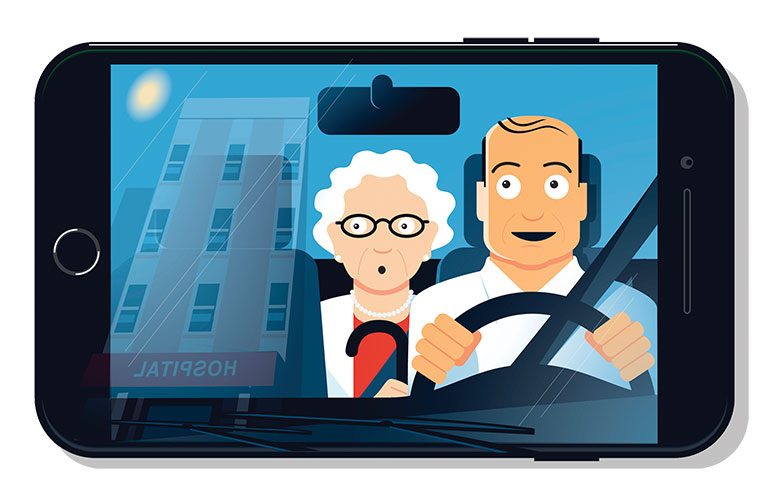
Mark Switaj likes overcoming obstacles. The Holmdel native, a veteran of several health-care companies, recognized a problem getting patients—especially aging and low-income patients—to their frequent medical appointments. Existing services for those physically or financially incapable of driving themselves tended to be unreliable, turning would-be patients into no-shows.
Inspired by the rise in ride-sharing services like Uber and Lyft, Switaj envisioned a solution. In 2016, he launched RoundTrip, a portal that links users to rides for medical appointments, including recurring treatments such as chemotherapy, radiation, dialysis and physical therapy. RoundTrip uses Lyft for patients who do not need medical assistance or supervision during transport and medical vans and stretchers for patients who do.
Switaj, who has an MBA from Georgetown University, first witnessed the no-show phenomenon as a volunteer EMT in his hometown’s first-aid squad, and later as a business development director for American Medical Response, one of many national non-emergency medical transportation (NEMT) providers. When it came to patient transport, he says, “the role of technology was very limited.” Many NEMT providers, he says, rely on antiquated software that often requires time-consuming manual corrections, creating an unreliable system that frustrates the people it’s designed to help. One elderly patient told him she’d given up going to her doctors because the ride service she used was so bad.
The no-show phenomenon is problematic for both patients and the healthcare industry. For patients, skipped appointments can set back recovery, causing medical conditions to worsen, and in some cases lead to expensive ambulance trips to the emergency room. For the healthcare industry, it’s a crisis that costs an estimated $150 billion a year.
Switaj started his Philadelphia-based company with $1 million from several backers. In late 2017, RoundTrip received an additional $1 million in funding from investors, including Johns Hopkins University.
The cost of rides coordinated by RoundTrip is either covered by Medicaid, Medicare, commercial insurance or by the health facilities, which would rather pay for transport than foot the cost of no-shows. Patients can also set up their own rides using a credit card. They don’t need a smartphone to use RoundTrip, and can opt to receive alerts in English or Spanish by text or phone call. (RoundTrip is working on adding Korean and Polish to their system in response to customer requests.)
In New Jersey, RoundTrip serves facilities including the Cooper University Health System, MD Anderson Cancer Center, Camden Coalition, Holy Name Medical Center in Teaneck and Bancroft, a network of neurodevelopmental centers throughout South Jersey. After partnering with RoundTrip, the Cancer Center reduced its transportation costs by 30 percent and its patient no-show rate from the typical 15-25 percent range to 4 percent. RoundTrip cites the latter figure as the average for its services across 15 states.
Facing the same problem, HackensackUMC contracted with Uber in 2016, the first rideshare-hospital partnership in the nation. The sprawling medical campus has six designated pick-up and drop-off locations marked by co-branded signs. The success of the program and others led to the launch in March of Uber Health, a subsidiary specializing in medical transport. Other Uber partnerships now include RWJBarnabas for Jersey City Medical Center and all seven locations of Pro Staff Physical Therapy. Lyft, in addition to working with RoundTrip, has established a partnership with Hackensack Meridian Health for JFK Medical Center in Edison.
Switaj hopes to expand RoundTrip to help New Jersey’s at-risk population get to other essential destinations, like work and the grocery store. RoundTrip established that model in Richmond, Virginia, and aims to partner with NJ Transit’s paratransit program to do the same for cities here.
“It’s our passion,” Switaj says of the people working at RoundTrip. “We went into this to solve a problem.”



